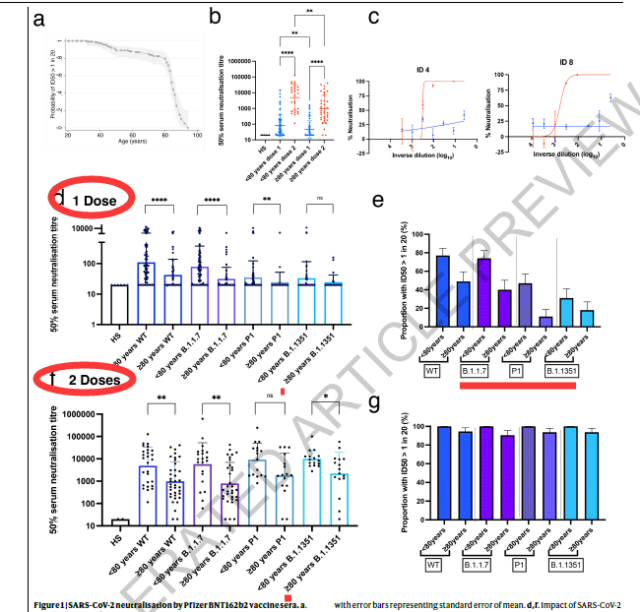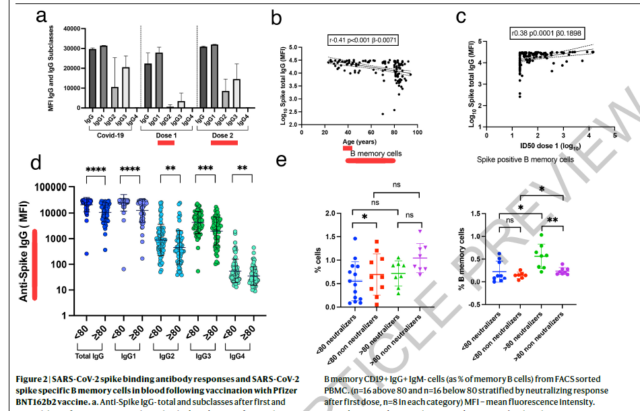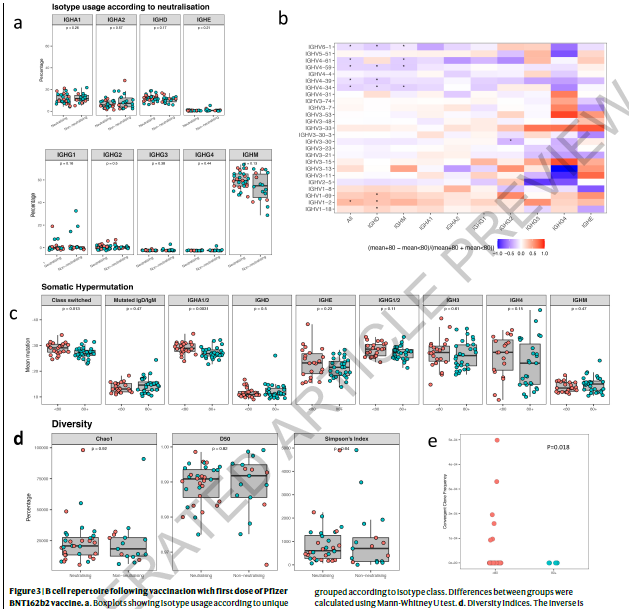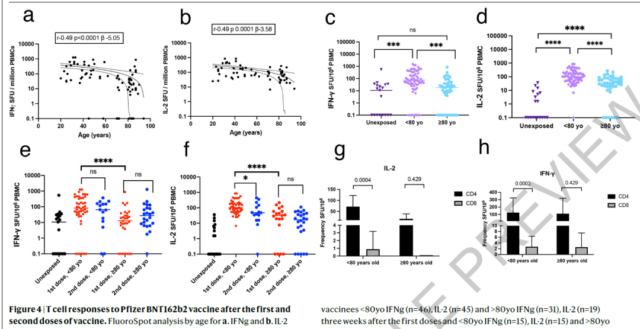The first COVID-19 post-vaccination immune response study of the elderly
- Normal Liver Cells Found to Promote Cancer Metastasis to the Liver
- Nearly 80% Complete Remission: Breakthrough in ADC Anti-Tumor Treatment
- Vaccination Against Common Diseases May Prevent Dementia!
- New Alzheimer’s Disease (AD) Diagnosis and Staging Criteria
- Breakthrough in Alzheimer’s Disease: New Nasal Spray Halts Cognitive Decline by Targeting Toxic Protein
- Can the Tap Water at the Paris Olympics be Drunk Directly?
The first COVID-19 post-vaccination immune response study of the elderly
The first COVID-19 post-vaccination immune response study of the elderly, published by Cambridge in Nature; the British government plans from this: It is expected that the vulnerable elderly will be intensively vaccinated in September.
Facing the COVID-19 infection, the risk of death mainly includes: old age, obesity, and underlying diseases; among them, the elderly are the most vulnerable. Among the 120,000 people in the United States who died of illness in the early days of infection with the COVID-19 virus, more than 40% of the deaths were elderly people in nursing homes and other long-term care institutions.
Nearly half of the deaths in the United States are from this group of people. This is heartbreaking news.
During the spread of the epidemic, the continuously evolving mutant strains, whether they are infectious or escape to neutralize the immune response, are more dangerous.
In this case, do elderly people who have been vaccinated have enough immune responses, and how can they prepare for the next wave of COVID-19 that may occur in the fall?
The University of Oxford in the United Kingdom specifically studied the immune response of vaccinated elderly people to the mutant strain, and published it in Nature on June 30, 2021. The immune response research on elderly people over 80 years old who were vaccinated with BNT162b2 showed that: The response is fragile, and it is necessary to take measures to improve the immune response.
1. Immune antibodies
Immune antibodies in the circulation are the first step to directly bind and eliminate the new coronavirus.
The study found that after the first dose of vaccination, serum neutralization and binding of IgG/IgA decreased with age, and subjects over 80 years old decreased significantly. After the first BNT162b2 vaccination of subjects over 80 years of age, the serum neutralizing activity to B.1.1.7, B.1.351 and P.1 was significantly reduced, and the elderly subjects who had a serum response to vaccination developed S The frequency of protein-specific memory B cells is higher.
The serum after inoculation with the second dose of BNT162b2 still has neutralizing activity against VOC mutants.
This study suggests that for the elderly, especially in response to mutant strains, two doses of immunization are necessary.

2. Memory B lymphocytes
There is a problem with the neutralizing antibodies directly facing the new coronavirus, that is, it will gradually decrease over time; at this time, whether the memory B cells that can secrete neutralizing antibodies are activated is very critical in the middle and late stages of the immune response. .
The study found that the type switching of B cell peripheral development and the frequency of somatic hypermutation in elderly subjects were significantly reduced.
This means that the activation of memory B cells in the elderly is weak.


3. Helper T cell immunity
The new coronavirus-specific helper T cells are required to activate B lymphocytes, thereby enhancing the secretion of neutralizing antibodies by B cells and affecting the amount of antibody production.
This study found that in the elderly, the IFNγ and IL-2 responses of S protein-specific T cells decreased with age.

It is consistent with the phenomenon of reduced immune response after organ transplantation and tumor patients’ vaccination.
This study pointed out that the immune response of the elderly to the new coronavirus is fragile and is a high-risk group. Special vaccination measures need to be taken to improve vaccine responsiveness.

(Margaret Keenan, 90 years old, the world’s first approved mRNA vaccine)
The clinical value of this study
This study showed for the first time that the immune response of mRNA vaccination in elderly people is weak, especially against the COVID-19 mutant strain.
Stand by:
- The elderly need to complete 2 doses of vaccination;
- After a period of time, it is necessary to intensively vaccinate the elderly.
Today, the Financial Times also reported that the British government plans to vaccinate older and more vulnerable Britons with a booster shot of the COVID-19 vaccine from September to enhance their resistance in winter and suppress mutant strains.
The academic value of this research
When we encounter good papers, we always like to keep them as templates so that we can learn from them when we do our own research in this area. The research on the new coronavirus is the most complete and worthy of reference.
This research was published in Nature. On the one hand, it is because of the first study of the immune response of elderly vaccinators after vaccination (the first), and also because the research design is very rigorous and complete (the last).
In this study, specific immune molecules and immune cells against mutant strains were detected from the aspects of antibody level, specific B cell immunity, and helper T cell immunity, and a comprehensive analysis was made.
It has very good reference value for the study of infectious diseases and autoimmune diseases.
(source:internet, reference only)
Disclaimer of medicaltrend.org
Important Note: The information provided is for informational purposes only and should not be considered as medical advice.



